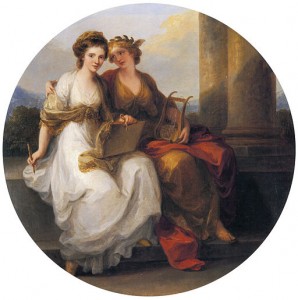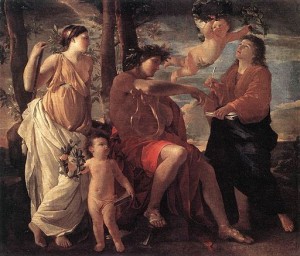
Angelica Kauffmann (1741-1807), The Artist in the Character of Design Listening to the Inspiration of Poetry. The painter is at left.
I’ve been mulling over some journal entries by Flannery O’Connor, written in 1946–47, when she was twenty-one and a student at the Iowa Writers’ Workshop. The entries show her struggling with the tension between her ambition to be a successful writer and her desire, as a devout Catholic, to think about God “all the time.”
You are the slim crescent of a moon that I see and my self is the earth’s shadow that keeps me from seeing all the moon. … what I am afraid of, dear God, is that my self shadow will grow so large that it blocks the whole moon, and that I will judge myself by this shadow that is nothing. …
What I am asking for is really very ridiculous… at present I am a cheese, make me a mystic, immediately. (New Yorker, 9/15/2013)
She wants success but she’s also afraid it will give her a swelled head, which will get in the way of being able “to love God all the way.” So she keeps reminding herself of things that will keep the shadow from growing.
When she produces a story after a dry period, O’Connor notes that it wasn’t really she who wrote it. “Don’t let me ever think, dear God, that I was anything but the instrument for Your story—just like the typewriter was mine.” Then she begs him to make the story a “sound,” good one because she doesn’t know how to do that herself.
Some time later, she cycles back into discouragement. “If I ever do get to be a fine writer, it will not be because I am a fine writer but because God has given me credit for a few of the things He kindly wrote for me. Right at present this does not seem to be His policy. I can’t write a thing.”
I am not a mystic, much less a Catholic or even a Christian, but this strikes a chord for me. If you disregard the specifics of her terminology, she is simply talking about where the inspiration to write something comes from. In my experience, that’s a mystery: the ultimate source isn’t one’s self and isn’t under one’s control. (I felt this most purely with my own two books, which I wrote from the greatest depths I was capable of. But even in collaborations, when I’m setting out other people’s ideas, I often find solutions to problems of structure or expression arising in intuitive leaps out of “nowhere”—not quite the same, but close enough.)
In the early stages of conceptualizing my first book, The Women Outside, I remember sitting on my knees on the floor and suddenly having a sense of a column of energy—or something—streaming upward from my head and mingling with some larger entity “out there.” Or maybe the energy from out there was coming down into me. It’s been so long I don’t recall. But the feeling that I was connecting to something larger than myself was clear. It never happened again, but as I worked on this and my other book, Slaying the Mermaid, I felt quite distinctly that they were coming through me from somewhere else, entering in the region of my solar plexus, then traveling upward to where my brain could operate on them.
I wouldn’t call that larger something God, but there are other options: the collective unconscious, universal mind, nondual awareness, the unconditioned, Buddha-mind, rigpa, consciousness with a capital C… and those are just from traditions I know something about.

Nicolas Poussin, The Inspiration of the Poet (1630). A poet writes under the inspiration of Apollo, who is accompanied by a muse and two cherubs.
It’s quite literally inspiration, which comes from a Greek word meaning God-breathed and a Latin word meaning blow into. That is, a divine being is breathing something into you. The ancients spoke of the muses, O’Connor speaks of God. I don’t know what to speak of, but I know what it feels like.
And I agree with O’Connor that it’s good not to get a swelled head, but rather to remember the mystery.

Thank you! on all counts. With respect to breaking through the mud, I learned long ago, from an author whose book I edited, how the unconscious–which is how I think of it in that context–does so much work in the background. That’s why I always try to finish a job a couple of days before deadline. Easier to let the thinking happen while I sleep than to sit at my desk beating my brains out. I once wrote a post about this, which is no longer up here but is still on Facebook.
And I totally agree with your last sentence.
Stef,
How good to be in touch again with your extraordinary analytic processes! I read O’Connor’s letters years ago, and found them fascinating. I’m looking forward to her journals.
Your post touched off something in me, starting with “inspiration” and its multiple meanings. Not just the lighting of the inner fires, but a simple inbreath, which we do every few seconds without thought. As I read, I began to breathe in and out deliberately, thinking about it, and suddenly I found that taking the air in was quite difficult. I had to mentally kick myself to breathe.
That has happened to me in meditation, a few times. I feel the expiration (outbreath and, curiously enough, death) go on and on and on and then – hey, breathe in, idiot! And I do, with an effort. From far away.
I remember ages ago getting stuck writing, usually fiction that I hadn’t felt through very thoroughly, but had written out in a burst without a beginning or end in sight. And how I broke out of the mud I no longer remember, if I ever knew. But somehow nowadays, I am willing to go off and do stuff – clean the floors, take a walk, pill a cat – and happily not write, until suddenly, something is there and must come out. These days, I synthesize a good bit of biological information into something non-biologists who are interested in the critters who interest me can understand. And the writing is fast; it’s the shaping that takes forever and some sort of inspiration. Whether it comes from a force outside me or not, I almost doubt. The process makes me believe that I, we all, are part of that force, and it comes out of us in the channels we’ve carved with our various gifts.
So thanks!
Your page is very beautiful!